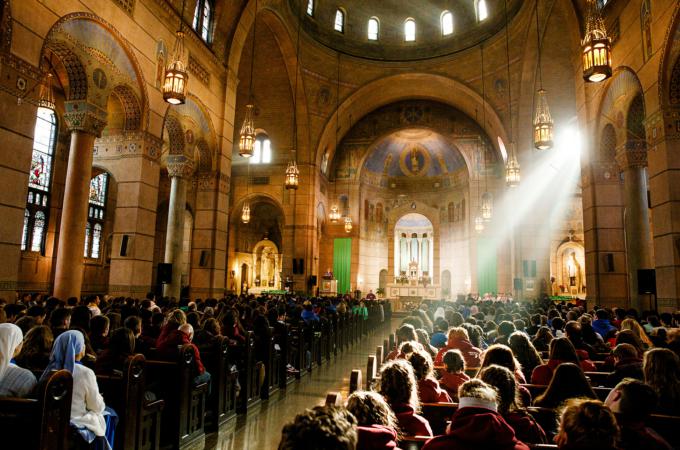Moral authorities
There is an unavoidable circularity in ethics. We decide whether a teaching is correct, based on the life of the person who teaches it, but we also decide whether a manner of life is praiseworthy, based upon teachings that we already accept.
The circularity should not be surprising if, "A good tree cannot produce bad fruit, nor can a bad tree produce good fruit" (Mt 7:18). Sometimes, seeing only a good-looking tree, we infer that the fruit must be good, and sometimes, seeing only good-looking fruit, we judge that the tree must be good.
Converts to the Catholic faith often get there by bootstrapping, narrowing in stages the authorities they rely upon, and the teachings they accept as true, in turn. These converts end up echoing the words of the Psalmist, "As for the saints in the land, these are the noble, in whom is all my delight," (Ps. 16:3). The teachings of the Church, and the saints who lived them, reinforce each other.
But of the two, the person seems to be prior to the teaching. The manner of life gives reality to the teaching. Thus the martyrs or "witnesses": who, because they were willing to die for the truth, testified to the truth.
One sees in the history of the Church that in times of widespread ethical confusion or hypocrisy, the saints have counselled careful attention to character and lives. "These are not times for believing just anybody," St. Theresa of Avila warned, "but believe only those whose lives are patterned on the life of Christ." This advice surely holds true today.
The principle is not a distinctively Catholic one. In any area, we look to the upright for ethical instruction. Interested in a code of conduct for doctors? Accountants? Lawyers? We try to identify the ethical ones and ask only these to write the code. Politicians in a representative government were once regarded in much the same way.
Can masses of people, then, ever count as moral authorities? Socrates said no. "If you want to take care of even your horse," he asked, "do you take it to any chance person, or only an expert? So, do you entrust your son to just anybody?" He was put to death by the people for such impertinence.
We can concede that in matters of basic natural law, "evident to all," the judgments of "humankind" in general are reliable. Consider as an example the 1948 Universal Declaration of Human Rights forged by representatives of several nations in the wake of the atrocities of the Second World War.
Yet one must take care not to erect into a "universal judgment of humankind" the predominant opinion of some nations only (e.g. the wealthy ones) or of some time period only (the "modern" world), which can serve as rationalizations of self-interested behavior. (The Universal Declaration recognized no "right" to abortion, or "marriage for all.")
So then how should those polls fare, which tell us "what Catholics think"? Obviously "Catholics" need to be broken into sub-groups, by drilling down to see how the respondents live.
If a poll, for instance, says that "80 percent of Catholics reject the Church's teaching on (fill in the blank)", the finding has no authority, unless we know how that 80 percent lives. Do they attend Mass without fail on the Lord's Day and Holy Days of Obligation? Do they pray every day? Do they avoid mortal sins? Do they have a sensitive conscience and go to confession regularly? Do they read lives of saints and histories of the Church? Do they meditate on the psalms? Do they know the New Testament? To ask these questions is not to be a narrow sectarian but simply to apply an evident principle about moral authorities.
The Church refers to the "sensus fidei" (instinctive grasp of the faith) or "sensus fidelium" (sense of what is true possessed by the faithful in general), which can be an important way that the Holy Spirit guides the Church. However, as the Church has taught, for genuine access to this instinctive sense of the faith:
"The first and most fundamental disposition is active participation in the life of the Church. Formal membership of the Church is not enough. Participation in the life of the Church means constant prayer (cf. 1Thess 5:17), active participation in the liturgy, especially the Eucharist, regular reception of the sacrament of reconciliation, discernment and exercise of gifts and charisms received from the Holy Spirit, and active engagement in the Church's mission and in her diakonia. It presumes an acceptance of the Church's teaching on matters of faith and morals, a willingness to follow the commands of God, and courage both to correct one's brothers and sisters, and also to accept correction oneself" (Sensus Fidei, 2014).
There is that circularity again. Can the sensus fidei lead to a change in the Church's teaching on faith and morals, if having that instinctive sense requires acceptance, and following, of the Church's teaching on faith and morals?
Let's make this concrete. Assume that 80 percent of Catholics neither accept nor follow the Church's teaching on artificial contraception. Impressive, huh? Yes, maybe, for setting a pastoral agenda. But we've seen it's the 20 percent whose opinion is authoritative. Let's ask them: in their experience, would they say that they've been right to avoid artificial contraception as something "intrinsically evil" (Veritatis Splendor, 80)? Or was that all a big mistake? What would these authorities say?
- Michael Pakaluk is Professor of Ethics and Social Philosophy in the Busch School of Business at The Catholic University of America. His book on the gospel of Mark, ‘‘The Memoirs of St. Peter,’’ is available from Regnery Gateway.



















